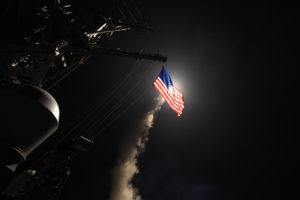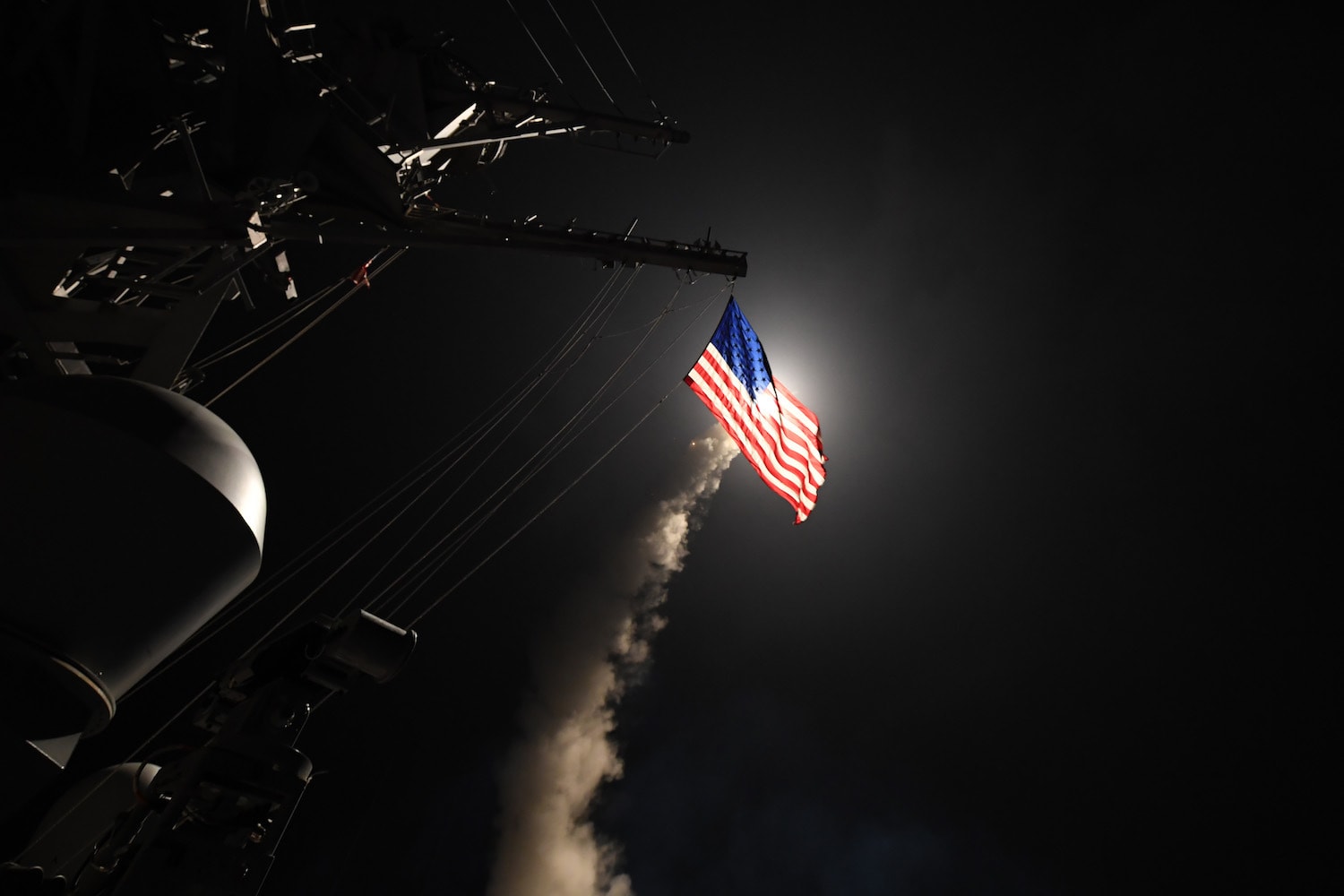
Photo: Ford Williams/U.S. Navy
By Mark Narusov
It was Saturday morning when the joint forces of the United States, France and the United Kingdom delivered a blow to the Assad regime’s chemical weapons capabilities, destroying three of the program’s most important facilities. The nonsensical and baseless concern about an Iraq-style invasion or even a policy of regime change was immediately nullified. The limited purpose of the attack, consistent with the the strikes themselves, was clearly articulated by all three heads of state: the defense of the international ban on the use of chemical weapons and the deterrence of future chemical attacks in Syria. The action came after the Assad regime’s chemical attack on the civilian population in Douma on April 7th. The hysteria about a possible escalation with Russia was also proven to be just that — Putin has overplayed his hand on Syria, and the United States easily managed to call his bluff for the second time, exposing Russia’s prior threats as bluster. The attack only caused 3 injuries — Russia was notified before the attack by the coalition, and the message was relayed to the Assad regime, so the facilities were evacuated.
It would seem that even destroying three vacated chemical weapons facilities used by Assad, without civilian deaths or a threat of escalation with rival powers, is too “imperialist” and “muscular” for some types. There are individuals, I was surprised to find out, who would be seemingly opposed to the very concept of inflicting costs on a regime for its use of WMDs on civilians. The recent article published by Gianmaria Amodeo in this newspaper is a good example of the farcical arguments supporting the immoral case against the damaging of a brutal dictator’s chemical weapons program.
Gianmaria starts by arbitrarily painting the action as driven by “machismo”. There is no need to speculate on the basis of feminist IR when there is good evidence that Trump’s motivation for striking the Assad regime was driven in part, as last year, by his emotional reaction to the photos of children affected by chemical weapons. The final decision, however, was anything but emotional or impulsive. Trump picked one of the more limited options and listened to the advice of the restrained Secretary of Defense James Mattis over that of the hawkish National Security Advisor John Bolton.
Although not central to his argument, Gianmaria’s false claim that the Western alliance is waging “war against Syria and Russia” matters because of its implication: that the strike was not limited and served a more aggressive strategy. American policy, and especially that of other Western states, has been consistently focused on narrow counter-terrorist goals, and there is no evidence that anyone important in Western governments still advocates for a policy of regime change in the country. The fact that the Russian government was notified of the attack by the coalition, as well as Trump’s conciliatory tone vis-à-vis Russia in his announcement on the Syria strikes say everything one needs to know about the supposed “war against Russia”.
In the same paragraph Gianmaria writes that “Two narratives are currently available to foreign policy makers to support military intervention in Syria”, falsely implying that the actual motivations behind the attack are inconsistent with the publicly announced purposes. One of these “narratives” is the concept of Responsibility to Protect. Once again, Gianmaria misses the mark on actual Western policy in Syria. The United States, France and Britain have only committed to ensuring that chemical weapons are not used by the Assad regime. There has been no Libya-style commitment to protecting Syrian civilians against all indiscriminate military actions by the regime, which would inevitably entail deposing Assad himself. Nevertheless, it is still useful to look at Gianmaria’s arguments against R2P, as the concept obviously has applications far larger than Syria.
He proposes a “hypocrisy test” that Western states would have to pass to be justified in acting to alleviate humanitarian catastrophes. The principle is this: if your potential action is inconsistent with past inaction, it is unjustified. Gianmaria wants us to believe that because you have done bad in the past you cannot and must not do good now. It’s telling when a simple explanation of an argument is also its strongest counterpoint. He also proposes an all-or-nothing conception of the humanitarianism of Western states. By mentioning that the United States and France have not been at the forefront of accepting Syrian refugees fleeing the conflict Gianmaria implies that their motivations for the strike cannot have possibly humanitarian. In fact, he misses a fundamental truth about human beings and, indeed, states: they have multiple motivations that are sometimes consistent with each other and sometimes not. The fact that the French and American governments wanted, contrary to their humanitarian inclinations, to limit the potential security risks that they believe accompany accepting more refugees does not negate the fact that, when the value of domestic security or others does not prevent it, humanitarianism guides Western responses to atrocities.
The second “narrative” that Gianmaria believes is used to justify American action in Syria is that of democratization. As with the first “narrative”, it has absolutely no relevance to the discussion on Syria in light of the limited nature of the West’s goals in the country, but it nevertheless needs a defense. Gianmaria likens Western efforts at promoting democracy to the past “colonial civilizing mission”. In fact, there is nothing in common between promoting self-rule and forcefully depriving the population thereof, except for the fact that both entail the West acting militarily beyond its borders. As to the suggestion that to be truly consistent the United States would have to invade Russia and China to promote democracy, Donald Trump himself acknowledged in his Syria speech that “We cannot purge the world of evil or act everywhere there is tyranny”. There is, in fact, nothing wrong with being selective about the atrocities that the West wishes to prevent and the countries in which the West should foster democracy — the costs and the strategic priorities both should and do play a role in deciding the right course of action.
The whole paragraph against a possible Iraq-style invasion should be dismissed as a textbook example of a strawman argument. Whether one sympathizes with the 2003 intervention or not, the fact of the matter is that the perceived failure of the Iraq War has left a deep impact on foreign policy thinking in all internationally active Western governments, forcing them to be highly restrained and mobilizing public opinion against even the most limited and precise military campaigns. As I mentioned, even a policy of regime change, leaving aside a full-out occupation, is completely off the table in intra-governmental discussions on Syria. In arguing against an invasion, Gianmaria writes that “a new war would only cause more casualties, while failing to resolve the complex political situation in the region”. The sentence is revealing of an attitude that much of the Western left has adopted with respect to Syria — the assumption is that a conflict only starts to count as a “war” once the West, the coalition of states most likely to alleviate the suffering, decides to do anything about it. One may wonder what number of casualties would be enough to let us classify the Syrian mayhem a “war”, since half a million deaths is clearly insufficient. The “complex political situation in the region” — the expansionist Iran with its protectorates (Lebanon, Syria, Iraq) assaulting the status quo powers (the Gulf states and Israel) — has not been resolved by the thorough and comprehensive diplomatic engagement under President Obama. The obvious right response to an avowedly revisionist power is more containment, not more reconciliation.
Gianmaria writes that instead of militarily attacking Assad’s assets, Trump should focus on “international cooperation” to resolve the Syrian conflict. What it entails is giving up all the leverage the West has and may potentially have by disavowing the use of force to end up relying on the good faith of a totalitarian dictator. The Assad regime has little incentive to make peace with the rebels as long as he knows his forces will be able to reconquer the country’s whole territory without concessions. It is only military leverage that may force him to the negotiating table. Contrary to Gianmaria’s dichotomy, it is only by being “muscular” that the West can be truly “empathetic”. One should remember that diplomacy not backed up by the threat of force has resulted in a sham 2013 agreement sponsored by Russia that was supposed to rid the Assad regime of its chemical weapons.
While Gianmaria has managed to sum up most of the arguments against the Syria strikes, there are yet some that need addressing. The West’s useful-idiot-in-chief Jeremy Corbyn tweeted that “Bombs won’t save lives or bring about peace”. I don’t need to do the arguing myself in this case, since the great researcher Eliot Higgins exposed the sheer idiocy of the statement in one tweet: “They will if they destroy Assad’s capacity and willingness to deliver future chemical attacks.” Alas, they have only partially destroyed the capacity and likely only partially undermined the willingness, yet one should not forget that Corbyn is concerned that there has been an attempt at this at all.
Some have deemed the attack “illegal” and thus condemnable on these grounds. Paraphrasing a point frequently made by the brilliant researcher Kyle Orton, if any “legal” intervention is to require an approval from the permanent members of the UN Security Council, and if that legality is to determine the morality of an action, then what the argument entails is that in responding to atrocities and international crises Western governments should only act when the brutal dictatorships of China and Russia will allow them to. Considering the fact that the Putin regime since the execution of Gaddafi considers the forced deposition of any tyrant an existential threat, that doesn’t amount to much.
If we, the liberal-minded of this world, can’t even build a solid consensus in support of such a limited strike as the one carried out by the Western allies on Saturday, then things are truly looking bad for the West’s ability to use its hard power to tackle problems that are morally more complex than sending a message to a dictator who gasses children with chemical weapons.
Other posts that may interest you:
- Carbon dioxide removal – hit or miss?
- Local Victories for Turkish Opposition — A Sign of Hope?
- Are France and Japan a Mismatch Made in Heaven?
- A Reflection on Dark Tourism
- Cadavre Exquis : Goodbye stranger
Discover more from The Sundial Press
Subscribe to get the latest posts sent to your email.





